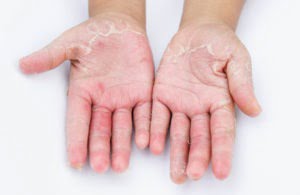August is Psoriasis Awareness Month, a time dedicated to raising awareness about psoriasis and its impact on individuals worldwide. While most people are familiar with psoriasis as a skin condition, there is a lesser-known form called ‘occupational psoriasis.’ This variant occurs specifically in the workplace, and its identification and early intervention are crucial for the health and well-being of employees. As a leading occupational health service provider, Healthscreen is committed to empowering employers to protect their workforce from potential health hazards. In this blog post, we delve into the significance of occupational psoriasis and how employers can take proactive steps to safeguard their employees’ health through our specialised dermatology screening service.
Causes of Occupational Psoriasis
- Environmental Triggers: Various environmental factors in the workplace can contribute to the development or exacerbation of psoriasis. These may include exposure to irritants, allergens, chemicals, and physical stressors. For instance, healthcare workers frequently use disinfectants, hairdressers handle hair dyes, and construction workers are exposed to cement and other construction materials, all of which can trigger or worsen psoriasis symptoms.
- Occupational Stress: Chronic occupational stress has been linked to an increased risk of developing psoriasis. Work-related pressures, long working hours, and high-demand job roles can take a toll on employees’ mental and physical well-being, potentially exacerbating existing psoriasis or triggering its onset.
- Physical Strain: Some occupations involve repetitive movements or physically demanding tasks that can strain the skin, leading to the development of occupational psoriasis. Workers in professions requiring repetitive hand movements or heavy lifting are particularly susceptible.
Symptoms of Occupational Psoriasis
- Red, Inflamed Skin Patches: The hallmark symptom of occupational psoriasis, like other forms of psoriasis, is the appearance of red, inflamed patches on the skin. These patches may be covered with silvery scales and can be itchy and painful.
- Scaling and Cracking: The affected skin may develop scales that flake off, and the skin may crack, leading to discomfort and increased vulnerability to secondary infections.
- Swelling and Stiffness: In some cases, occupational psoriasis can lead to joint inflammation, causing swelling and stiffness. This is a condition known as psoriatic arthritis, which can further impair an individual’s ability to perform their job effectively.
- Worsening Symptoms at Work: One of the key indicators of occupational psoriasis is the worsening of symptoms during work hours or shortly after exposure to workplace triggers.
- Impact on Emotional Well-being: Occupational psoriasis can significantly affect an employee’s emotional well-being. The visible nature of skin lesions can lead to self-consciousness, anxiety, and reduced self-esteem, potentially impacting their productivity and overall work satisfaction.

The Need of Proactive Health Measures
Recognising and addressing occupational psoriasis is essential not only for the affected employee’s health but also for the overall work environment. By proactively identifying potential cases of occupational psoriasis, employers can:
- Enhance Employee Health and Productivity: Early detection and timely intervention can prevent the condition from worsening, thus reducing sick leaves and enhancing productivity.
- Foster a Safe Work Environment: Taking measures to mitigate the risk of occupational psoriasis demonstrates an employer’s commitment to the health and safety of their workforce.
- Improve Employee Morale: Knowing that their employer values their health can boost employee morale and loyalty.
- Comply with Legislation: Employers have a legal and ethical responsibility to adhere to occupational health and safety regulations. By recognising and addressing occupational psoriasis, employers fulfil their obligations under relevant legislation and contribute to a compliant and responsible workplace.
Healthscreen’s Dermatology Screening Service
At Healthscreen, we offer a specialised dermatology screening service designed to detect and address work-related skin issues. Our expert team is well-versed in recognising the signs and triggers of these conditions. Here’s what our service entails:
- Comprehensive Dermatological Evaluation: Our skilled dermatologists will conduct thorough assessments to identify any potential cases of occupational psoriasis among your employees.
- Targeted Intervention Plans: In the event of a diagnosis, our team will collaborate with employers to develop personalised intervention plans to mitigate workplace triggers and support affected employees.
Act Now to Safeguard Employee Health
As we observe Psoriasis Awareness Month this August, let us not overlook the significance of occupational psoriasis. Employers have a crucial role to play in protecting their employees’ health and well-being. By partnering with Healthscreen and availing our specialised dermatology screening service, you can take proactive steps to safeguard your workforce from the impact of work-related skin issues. Don’t wait: contact us today!







